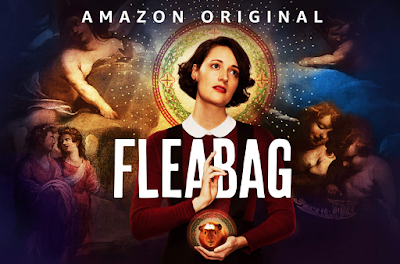I loved Fleabag, and we NEED one more season
So if you aren't up on the hottest series finding daylight after Game of Thrones' massive shadow has started to dissipate, it is Fleabag. Title not withstanding -apparently a half-cute, half-insulting nickname for writer-actor-director Phoebe Waller-Bridge- this show is everything you want from top shelf HBO minus the dragons and gratuitous nudity, except it is British and on Amazon.
Now before you fire up your streaming gadgets, know this show is chock full of X-rated content but doesn't stoop to visualizing all naughty bits just too reel in the Bros. I mean the first scene in the show involves painful sodomy and strong cursing about said sodomy. The only reason I'm not describing it in further detail is I'm certain my pre-adolescent children will one day discover this website and I don't want them to learn the vulgarities and explicit details of intercourse from their parent's digital ghost. (Hi kids! I promise I'll stop using the word sodomy.)
Waller-Bridge delivers an all-time, low concept anti-hero tale. Her title character –whose given name or nickname is never said on the show– is equal parts Gaylord Focker, Deadpool, and Barney Stinson except female and somewhat self-aware of her penchant for carnage. The first season was spent establishing characters and backstory in a very smart web of dark humor, foibles, sexual adventures, and earnest strife. The character Fleabag is a well-intentioned, sexual ravenous, selfish, and blunt person who can't seem to find her financial or interpersonal footing by the age of 33. Oh, and she routinely breaks the fourth wall, addressing the viewer directly.
Season one is fun and stress inducing but doesn't quite overcome the issue that Fleabag is the object of her own destruction. It is a good ride, but not the kind that riders feel the absolute need to tell everyone they must check out.
Season two is where Waller-Bridge delivers the existential goods. HEY SPOILERS COMING For how deftly crafted season one is, the use of sexual adventures as a plot device –almost comedy action scenes (disregard the pun please)– allows the audience to slip into lower brain gears. Basically "pretty young girl having sex, I like watching this." It is a shame, because even though Fleabag is a fully actualized, in-command-of-her-desires woman, it doesn't FORCE viewers to grapple with greater thoughts the way season two does.
In Season two we've still got Fleabag, her dysfunctional family, her excellently acted sister, and Fleabag's 4th wall quips, but we are also taken on an introspective journey of wants, desires, and needs. Existential crises abound. Literally, the main conflict is Fleabag's uncontrollable desire to sleep with a Priest.
Okay, you can't have a narrative conflict like that –nevermind simply writing the sentence– without some self examination. That is what makes season two so great. Season one ends with the title character getting a toe hold on one of the crumbling aspects of her life. Season two uses that tenuous grasp to push her to examine her choices. Hence the show puts it haughty elements on the backburner, instead ruminating on why such a strong, vibrant, intelligent woman actively tries to guide her life by chaos.
My favorite part of the entire series is the use of 4th wall breaking. This tool is deployed in virtually every film or series to show how in-command and smart a character is. Well Fleabag is smarter than she lets anyone know, but "in-command?" No. She is constantly pressing the self-destruct button on her life's guidance system.
It isn't until season two where we learn Fleabag's breaking the 4th wall is a coping mechanism for when she is losing grip of what she thinks is command. Her quips and asides to the viewer are her blind override commands to her emotions. This is so expertly illustrated when she starts forming a relationship with the Priest (who is his own cocktail of a crass enigma). Her wall breaking isn't as heavily leaned on in season two and when she starts doing it during some of the more formative moments of their relationship, the Priest actuals notices! Turns out she isn't Zack Morris or Wade Wilson, she's closer to Wayne Campbell. The audience is privy to her interior commentary but apparently others can hear her as well. These Priest inquires to her asides throws her completely off, as well as the audience. Probably because he is intuitive and genuinely interested in Fleabag's well-being and inner-character.
The Priest witnessing, but not fully understanding, several wall breaking episodes is wild. I love the themes and delivery of season two, but this little twist changes the game. It turns out Fleabag isn't an anti-hero but an even more complex constellation of successes and failures, and when someone sees through her armor of snark her vulnerability reveals her true, good nature.
Phoebe Waller-Bridge needs to deliver a third season. No one in the short run of the show operates in the same headspace. The Priest gets close, but they both know it is not meant to be. Season One we are lead to believe Fleabag is the villain, season two we see her getting redeemed while making peace with her enemies, and season three SHOULD show you don't have to be a hero or even altruistic to be a good person.
I am 100% certain in saying that a third season is mandatory at this point. If Fleabag were meant to be a flip romp through a self-sabotaging walking disaster's life, season two should have never been broached. But it only seems logical that if this is the trajectory Ms. Waller-Bridge wants to take her character down, the arc must be completed to show you can open yourself up to people, be vulnerable, and discover your worth without changing your personality or idiosyncrasies. Good people aren't xeroxes of each other. I hope that is what we'll find out in season three. Good people are just as complex and complicated as "bad people." In fact, I hope season three simple destroys that dichotomy in favor of the fact goodness is a sliding spectrum where the rider is never cemented on one end or the other.
Phoebe Waller-Bridge needs to deliver a third season. No one in the short run of the show operates in the same headspace. The Priest gets close, but they both know it is not meant to be. Season One we are lead to believe Fleabag is the villain, season two we see her getting redeemed while making peace with her enemies, and season three SHOULD show you don't have to be a hero or even altruistic to be a good person.
I am 100% certain in saying that a third season is mandatory at this point. If Fleabag were meant to be a flip romp through a self-sabotaging walking disaster's life, season two should have never been broached. But it only seems logical that if this is the trajectory Ms. Waller-Bridge wants to take her character down, the arc must be completed to show you can open yourself up to people, be vulnerable, and discover your worth without changing your personality or idiosyncrasies. Good people aren't xeroxes of each other. I hope that is what we'll find out in season three. Good people are just as complex and complicated as "bad people." In fact, I hope season three simple destroys that dichotomy in favor of the fact goodness is a sliding spectrum where the rider is never cemented on one end or the other.






Comments